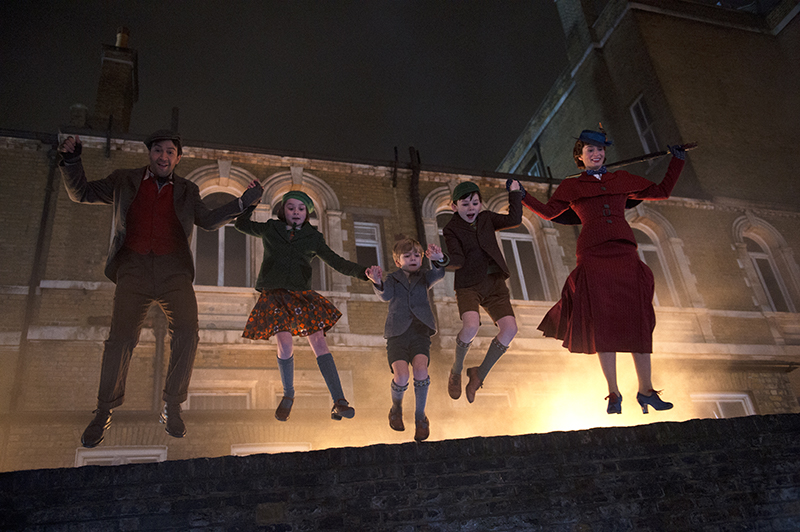Mary Poppins Returns
Fifty-four years after Julie Andrews first appeared on screen as the titular nanny, Emily Blunt steps into her Oxfords to return to the Banks’ household just as things are falling apart. Now grown, Michael (Ben Whishaw) with children of his own, finds himself in financial distress…

(L-R) Lin-Manuel Miranda, Pixie Davies, Joel Dawson, Nathanael Saleh and Emily Blunt in Walt Disney Studios' MARY POPPINS RETURNS.

From Shakespeare to Dickens to Pamela Lyndon Travers, the author of the novel on which Disney’s Mary Poppins is based, British fiction has a rich history of class conflict, violating tradition and decorum to do what’s morally just.
Fifty-four years after Julie Andrews first appeared on screen as the titular nanny, Emily Blunt steps into her Oxfords to return to the Banks’ household just as things are falling apart. Now grown, Michael (Ben Whishaw) with children of his own, finds himself in financial distress as the lender who once employed his father decides to accelerate the mortgage on his house. His three children, Anabel (Pixie Davies), John (Nathanael Saleh), and Georgie (Joel Dawson), learn that Michael and his sister Jane (Emily Mortimer) inherited stock certificates from their father’s employment at the bank. The institution has since grown so large, and so valuable, that the certificates would almost certainly relieve them of their debt.
While in and of itself, the kids-saving-the-family-from-financial-ruin-with-circuitous-causality plot is merely a backdrop against which an instantly endearing sequel unfolds. Where a film like Spielberg’s HOOK failed, MARY POPPINS RETURNS succeeds on the sincerity of its effort. The former erred attempting to bring modern, adult sensibilities to a children’s film set in a period. This not only makes HOOK feel dated on subsequent viewings, but burdens it with the intractible task of trying to please two audiences simply out of commercial interest. This trend led to the fast burnout of franchises such as SHREK, inundated with promotional tie-ins under the paper thin guise of pop culture jokes. It wore out faster than elbows on a leisure suit.
Not so with Deuxièmes Poppins. The filmmakers firmly plant us in the fictionalized London, with its stylistic exaggerations of the city’s brownstones, fog, and winding, cobblestone streets. There are no exchanges of wisecracks in an oddly-modern vernacular. Lin-Manuel Miranda’s lamplighter, Jack, raps. But it riffs off centuries’-old spoken-word cleverness more than contemporary hip-hop—and it works! The characters, story, and setting, remain mostly true and faithful to the tone of the original, while exploring a new narrative instead of a re-hash of its predecessor.
Filling in for Julie Andrews, whose elocution and manner so indelibly defines the character, is no easy task. Yet, at once we see an original yet familiar kind of Mary Poppins—proper but sassy. Emily Blunt, whose breakout role in THE DEVIL WEARS PRADA cemented her skill at blasé snark, maintains a delicate balancing act between affable lady and wry smart-ass.
Filled with flights of fancy—entertaining cameos, musical numbers, David Warner under heavy makeup—one sequence in particular sells the entire film. When Poppins sees that the children have broken their father’s “priceless” Royal Doulton bowl, she takes them into the world of the bowl to repair a broken horse cart. During this adventure, Mary and Jack transform into vibrantly-costumed Vaudevillians in an energetic number.
If Lin-Manuel’s escalating wordplay is the film’s highlight, then a stilted digression into Mary’s cousin Topsy’s workshop, seems off-kilter. The choreography lacks elegance, the lighting lacks nuance. It doesn’t feel very Poppins.
Following the tentpole song and dance routine at the Royal Doulton, a wolf and his henchmen kidnap one of the Banks children. The other two give chase into the nether regions of this world. The further this carries on, the wolf’s face becomes more twisted, his voice full of rage.
What I remember most of the 1964 original is how it balanced whimsy and sadness. Long before THE LION KING taught a generation about coping with loss, that old woman on the steps of St. Paul’s Cathedral taught us about homelessness and charity. More subtly, it’s also a lesson about the failures of certain institutions to look after their people. I’m reminded of a quote by Robert G. Ingersoll, “Ministers say that they teach charity. This is natural. They live on alms. All beggars teach that others should give.”
While the wolf metaphor has more to do with the greed of commercial institutions (irony of ironies, RALPH BREAKS THE INTERNET is a 112-minute advertisement for how enormous Disney’s commercial empire has become), there remains a lesson within. It’s undercut, however, by a sudden about-face inserted almost exclusively to shoehorn a last-second cameo. MARY POPPINS RETURNS remains mostly delightful, though not practically perfect in every way.
Penny Marshall, who passed just yesterday, taught my generation that the good in this world comes from people who use their imagination and creativity to solve problems. The evil in this world comes from those whose limited imaginations can only gain by taking from others. The next generation inherits from us a world filled with uncertainty, dread, even despair. Mary’s lesson is no different from Marshall’s: one can grow up and confront the problems of this world without losing one’s soul.